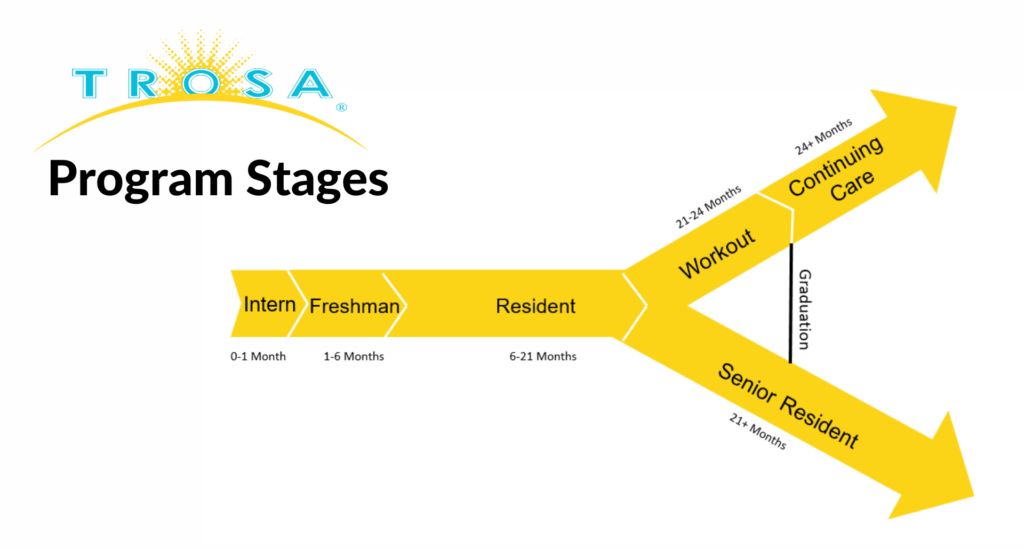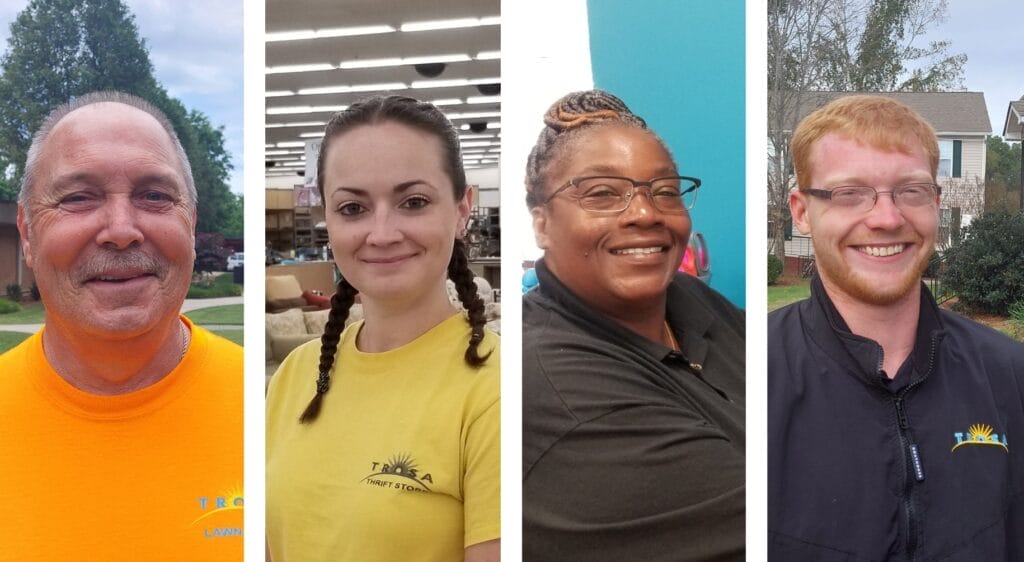TROSA is a thoughtfully designed multi-year program helping individuals achieve and sustain long-term recovery.
Recovery is a lifelong process and TROSA offers opportunities for participants to learn and practice skills for recovery every day. We promote personal development through a variety of programs and services. Key elements of the program include community assignments, education, communication, peer counseling, mentoring, leadership training, job-readiness, and continuing care services. TROSA participants learn life skills that empower them to live successful, sober lives.
This page outlines our different program stages and the positive benefits you can receive as a member of our recovery community at every stage.
Internship: 0 - 1 Month
Summary:
The first 30 days of any new lifestyle choice can be the most challenging; that’s why TROSA has a guided, highly structured orientation program.
Our internship stage is focused on learning about addiction, acclimating to early recovery, and being mentored by senior residents and staff. At this stage —and over the course of one’s program— treatment plans begin to be developed through early evaluation and assessment both formally and informally for services that fit each residents’ needs.
Benefits and Benchmarks:
- Learning the importance of honesty, integrity, and accountability; opportunities to put those concepts into practice
- Learning the importance of setting healthy goals and healthy boundaries
- Learning about adjusting to early recovery
- Strategies for managing cravings
- Learning how to care for oneself and the benefits of helping to care for others
- Treatment plans begin to be developed through early evaluation and assessment for individual needs and services.
Freshman: 1 - 6 Months
Summary:
Participants are placed in community assignments as part of their individualized therapeutic program. Along with classes, groups, and counseling, community assignments are safe spaces where participants can actively learn and practice how to live a life without drugs and alcohol. Routines are formed, connections are made, strengths are identified, and new life skills are acquired.
Benefits and Benchmarks:
- Learning to create and achieve goals
- Forming healthy relationships
- Practice of setting personal boundaries
- Learning and practicing vocational and life skills
- Learning to work collaboratively with others
- Learning strategies for confidence-building
- Learning to prioritize and manage time and resources
- Opportunities for leadership development
- Opportunities for education advancement (GED instruction and tutoring; adult basic literacy classes)
- Beginning to reconnect with family through phone calls and mail
Resident: 6 - 21 Months
Summary:
At this stage, residents are focused on goal setting, and shaping their professional and personal goals and receiving more individualized training and mentorship to reach these goals. Residents are also given more choices in their leisure time, housing, classes, and community assignments.
Residents are encouraged to take on leadership and mentorship roles, and take the lead in organizing campus activities.
Skills acquired at this stage can be helpful with future employment, reconnecting with family members, and being a productive member of a community.
The Resident stage encompasses a wide span of time and growth, from 6 months to 21 months, and a lot of learning happens in this time. Below is a breakdown of benefits and benchmarks at critical moments of the Resident stage.
6 - 12 Months
- Enhancing interpersonal relationships
- Demonstrating care for oneself and others
- Strengthening skills to develop professional and personal goals
- Learning to successfully adapt to changing environments
- Gaining more responsibility and accountability for oneself
- Opportunities for more enhanced therapeutic and professional classes
- Strengthening connections with family
12 - 18 Months
- Practicing strategies for living in long-term recovery post-program
- Understanding importance of responsibility and accountability for others
- Goal-setting for post-program success
- Opportunities for education advancement (college courses and professional certifications)
- Learning a greater sense of community
- Opportunities to practice an established living routine using skills acquired and behavior changes learned so they become inherent.
18 - 21 Months
- Preparing for professional employment through job readiness classes (developing resume writing, interviewing skills, and more)
- Learning financial management
- Learning more refined time management skills
- Learning and demonstrating relapse prevention strategies
- Understanding the importance of mentors and peers in recovery and demonstrating those qualities within the TROSA community
Senior Resident and Workout: 21 - 24+ Months
Summary:
At 21-months, residents can choose different paths. They can apply to stay longer beyond their two-year graduation date as a Senior Resident, or they can prepare to leave TROSA’s program by finding and securing local employment for their remaining months of program participation (this is called the “Work-Out” program).
Benefits and Benchmarks:
- Acquiring and practicing skills helpful for both interpersonal and professional relationships
- Opportunities for higher education through local college partners
- Demonstrating leadership and being a trusted mentor for others
- Creating a support network and structure for living outside of TROSA’s campus
Graduates: 24+ Months
Summary:
Our Graduate Services department offers optional continuing care and transitional services for program graduates. These services include:
- The option for safe, stable transitional housing and transportation to/from employment for up to one year
- Graduate support groups
- Opportunity to own reliable cars as available
- Opportunity to apply to our Staff-in-Training program, where they receive personal coaching and training with the goal of becoming a TROSA staff member. Approximately 70% of our staff are in recovery and most are TROSA graduates.



